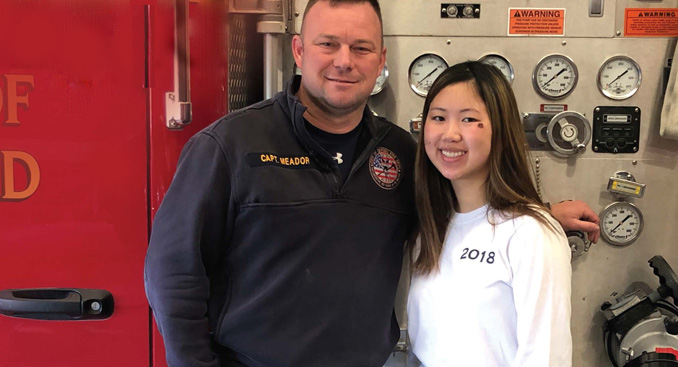Saving Kerri

On May 7, Kristy Peterson received the call every parent dreads. It was the Oxford paramedics, and they told her that her daughter, Kerri, a Miami University freshman, was at TriHealth’s McCullough-Hyde Memorial Hospital (MHMH). She was unconscious and breathing slowly, with a rapid heart rate and fever around 107. Kristy wasted no time. She got in her car and started the seven-and-a-half-hour drive from Buffalo, N.Y., to Oxford. “I was in constant contact with Kerri’s roommate as well as the ER staff regarding her condition,” says Kristy. “I was so upset that I listened to the same two songs the entire trip.”
A Life-Threatening Diagnosis
It was a Tuesday morning a week before final exams. Kerri had been feeling ill all weekend, and that morning she awoke with a headache, fever and chills. She thought she had the flu, but she dragged herself out of bed for a math quiz. That decision may have saved her life. “We were told that if she had not gotten up to go to class, she could have died in her sleep,” says Kristy. “Or, if she had left her dorm a few minutes later, she could have fallen down the stairs in the building.”
On her way to class, Kerri suddenly began running, flailing her arms and making strange noises. Then she collapsed. The campus police and the Oxford first responders arrived on the scene quickly. Kerri barely stirred from the paramedics’ attempts to rouse her. They weren’t sure what was wrong with her, but they realized she met the criteria for sepsis, in which the immune system stops fighting foreign invaders such as bacteria and turns on itself, causing tissue damage and organ failure. Chris Meador, Captain of the Oxford Fire Department, was so concerned about Kerri that he joined paramedic Jared Baker in the ambulance for the seven-minute ride to MHMH.
At MHMH, Alexa Sabedra, MD, an Emergency Medicine physician, assessed Kerri. She ran through the possibilities: seizure, illegal drugs, inadvertent exposure to a toxin, infection. “She was one of the sickest people I had ever seen,” she recalls. Dr. Sabedra quickly ordered comprehensive tests to determine if Kerri was septic. Meanwhile, Kerri’s roommate arrived and told Dr. Sabedra that Kerri had had an infection three weeks earlier. Kerri seemed to have gotten better, but she had experienced intense chills and a slight fever over the weekend. She and Kerri had assumed it was the flu.
Dr. Sabedra prescribed multiple antibiotics and fluids and put Kerri on a respirator to help her breathe. Meanwhile, she continued to update Kristy. “She was so far away, and I couldn’t imagine what it was like for her to be in the car, not knowing what she would be walking into,” says Dr. Sabedra.
When the test results came back, they showed Kerri was in septic shock—the most severe form of sepsis, in which blood pressure drops to dangerous levels—and the antibiotics Dr. Sabedra had given her were starting to work. But whenever the nursing staff repositioned her, her blood pressure dropped.
Dr. Sabedra arranged for a transfer that afternoon to the Intensive Care Unit at TriHealth’s Bethesda North Hospital.
Turning The Corner
A few hours after arriving at Bethesda North, Kerri was weaned off the ventilator. Four days later, she was discharged. Before heading home to Buffalo, mother and daughter visited the firehouse and the nurses and physicians who cared for her. “We felt it was important to personally thank the first responders and medical staff,” says Kristy. At the firehouse, the entire EMS team came to see her. When Chris Meador saw Kerri, “My jaw dropped,” he recalls. He was thrilled to see her progress and to share with Kerri and Kristy what had happened less than a week earlier. “Everyone was very excited to see Kerri, and we were grateful to have the opportunity to meet the first responders and thank them,” says Kristy.
The next stop was MHMH, where Kristy and Kerri thanked the staff, including the Emergency Department nurse who treated Kerri when she first arrived at the hospital. “She was surprised and happy to see Kerri, and she told us about her condition,” recalls Kristy. “It was a very emotional visit.”
Today, Kerri has fully recovered and returned to Miami for her sophomore year. “I’m grateful to everyone who helped me,” she says. Kristy echoes that sentiment. “We couldn’t have asked for better care,” she says. “Kerri was surrounded by caring and talented professionals, and words can’t express how thankful we are to each and every one of them.”